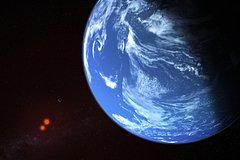'Convincing Analogue' of Earth Discovered

arXiv: Exoplanet Kepler-22b Could Be Considered a Compelling Earth Analog
Photo: Thierry Lombry / Shutterstock / Fotodom
Scientists from the Department of Information and Computer Science at the University of California, Irvine ( USA ) have discovered a "convincing analogue" of Earth. The authors published their research on the electronic preprint portal arXiv.
The researchers conducted a comprehensive multivariate statistical analysis of 517 exoplanets from NASA's database. Using eight key parameters (exoplanet radius, equilibrium temperature, solar flux, density, effective temperature of the parent star, radius, mass, and metallicity), they proposed a classification system that identified Earth as an "excellent candidate" for habitability.
The analysis conducted by the experts showed that only 0.6 percent of the sample (three celestial bodies, including Earth) meet all the habitability criteria at the “softened threshold values”, but only the exoplanet Kepler-22b can be considered a “convincing analogue” of Earth.
Of the sample used, about 75 percent of the bodies, according to the authors, exhibit the characteristics of "suitable star, unsuitable exoplanet," while 1.2 percent of the exoplanets are "borderline cases" of bodies orbiting M dwarf stars with "suitable planetary conditions but marginal stellar conditions."
In December 2011, NASA announced that the Kepler space telescope had discovered an exoplanet called Kepler-22b, a mini-Neptune, 600 light years from Earth. Kepler-22b orbits its parent star every 290 days. The planet's radius is about 2.4 times that of Earth.
Lenta.ru




